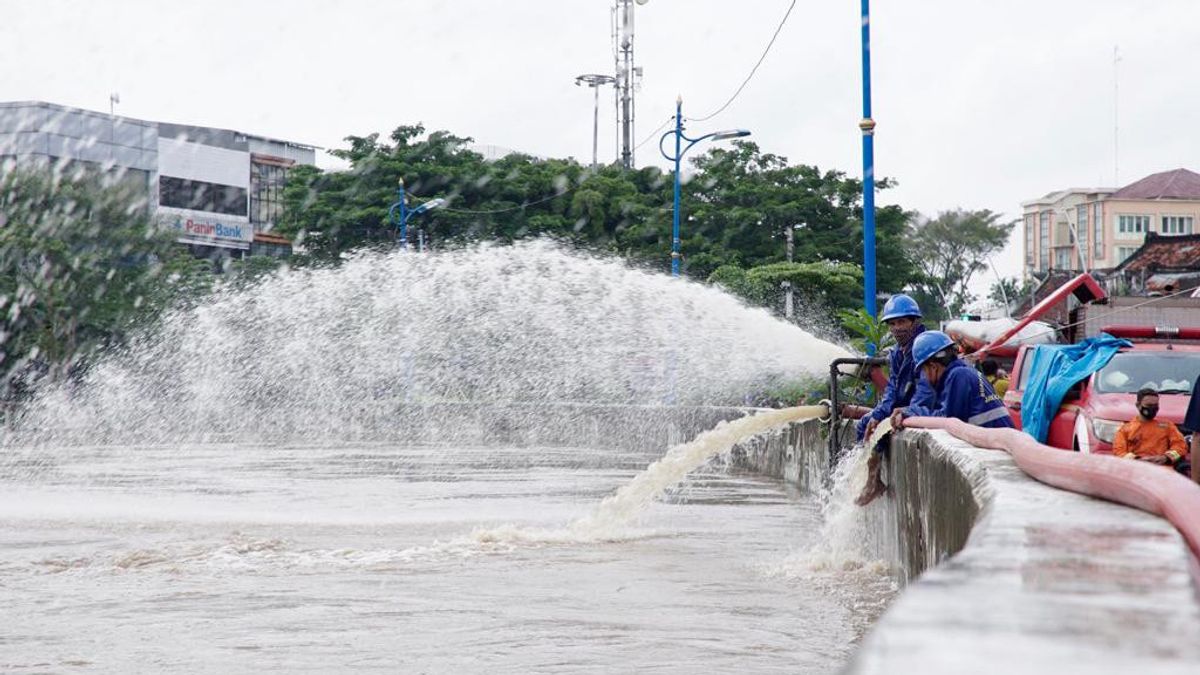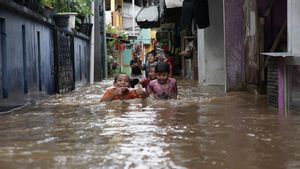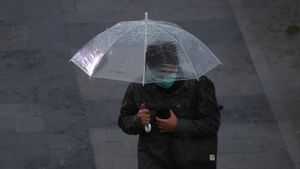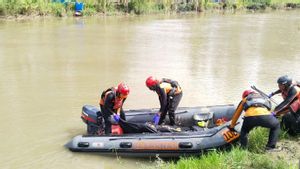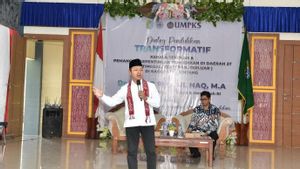JAKARTA - The capital city was hit by floods from Thursday, February 18 to Friday, February 19. East Jakarta is the area that is inundated the worst by floods.
However, the DKI Provincial Government claims that the current flood conditions are still better than the previous period. Then, the cause of the flood was mentioned because of the high rainfall.
Responding to this, the chairman of the PDIP faction at the DKI DPRD, Gembong Warsono, said that the handling of floods in DKI cannot be called a significant success.
This is because DKI Jakarta Governor Anies Baswedan is running a half-hearted program. Moreover, currently, there are no concrete steps related to the river normalization program. As a result, Jakarta is still flooded every rainy season.
"So when talking about flood handling as long as the DKI Jakarta Provincial Government cannot carry out normalization, I think it is difficult to overcome the flood problem. So, the key is normalization," said Gembong when contacted, Friday, February 19.
DKI has five flood control programs, namely Grebek Lumpur, vertical drainage (infiltration wells), pump maintenance, tidal flood management through NCICD, and polder system management.
SEE ALSO:
Gembong admitted that the program was actually useful for preventing large floods. Unfortunately, the results were not significant.
"If the governor and deputy governor claim that flood control programs such as grebek lumpur and infiltration wells are successful, then it should be no flood. So, whether grebek lumpur is significant for flood alleviation, I don't think so. But, yes, there are benefits," explained Gembong.
According to Gembong, while Anies was in Jakarta, the DKI Jakarta Provincial Government had not carried out its real duties regarding the arrangement of rivers and streams, both the normalization and naturalization programs.
However, Gembong revealed that Anies had budgeted the land acquisition budget for the river normalization or naturalization program. These funds are sourced from the national economic recovery loan (PEN) from the central government.

"In practice, there is no normalization yet. But, in the 2021 budget there is, through PEN funds, the DKI Provincial Government is already willing to start working on it (land acquisition)," he said.
For information, the DKI Regional Disaster Management Agency (BPBD) noted that there are 99 RTs in Jakarta that have been flooded since Thursday. In detail, there are 3 RTs in West Jakarta and 96 RTs in East Jakarta.
This condition is different from Anies' hope, where the flood can recede for up to six hours. Regarding the duration of handling inundation and flooding in Jakarta, the Acting Head of BPBD DKI Sabdo Kurnianto admitted that his party had tried to resolve inundation and flooding within 6 hours.
However, he emphasized, the duration of 6 hours has been calculated since the rain stopped and there were no more rivers or drains.
"Starting to count like that, since there is no more overflow and the rain has stopped. If there is still overflow from the river or channel, then it will not flow water either," said Sabdo in his statement.
DKI Jakarta Development and Environment Assistant Yusmada Faizal explained the cause of the flooding that has occurred from yesterday to today in a number of Jakarta areas, especially in East Jakarta.
Yusmada explained, the highest rainfall from yesterday to today is in the Halim Perdanakusuma area with 160 millimeters per day, Manggarai and Pasar Minggu 130 millimeters per day, and Sunter Hulu 107 millimeters per day.
Unfortunately, the drainage system in DKI is built with a rainfall capacity of between 50 and 100 millimeters per day. Drainage in the area is unable to accommodate water with high rainfall, resulting in water overflows to settlements.
"It should be noted, our drainage system is designed based on the rainfall of 50 to 100 milliliters per day. Therefore, if there is extreme rain up to 160 millimeters, it will overflow," explained Yusmada.
However, Deputy Governor of DKI Jakarta, Ahmad Riza Patria, compared the current number of flood refugee locations with the conditions when Joko Widodo's leadership took office as Governor of DKI in 2013.
In the flood since Thursday, February 18th, there were 99 RTs out of 30,470 RTs that were affected by the flood. The number of evacuation locations has only been recorded at 2 locations.
"As of today, the number of evacuations is very small. If you look at the data from previous years, there has been a significant decline," said Riza.
"In 2013, for example, there were 1,115 refugee points. In 2015 there were 337 evacuations. In 2018 there were no evacuations, in 2019 there were 13 points, in 2020 there were 70 points. In 2021 we are recapitulating, while there are 1 to 2 evacuation points," he continued.
Riza also compared the number of casualties due to floods. In 2013 there were 38 victims, in 2018 1 victim, in 2019 2 victims, 2020 2 victims.
In principle, said Riza, there was a significant decrease in the number of refugees and casualties. Thanks to the efforts of the people of Jakarta who support government programs.
"Hopefully in 2021, there will be no deaths due to flooding. The people who are affected are also decreasing, the affected villages can also decrease, the affected sub-districts will also decrease," he said.
The English, Chinese, Japanese, Arabic, and French versions are automatically generated by the AI. So there may still be inaccuracies in translating, please always see Indonesian as our main language. (system supported by DigitalSiber.id)
